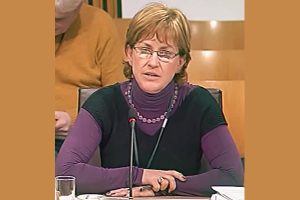Law Prof. Calls For UK To Ban Upskirts, Deepfakes In One Stroke
 LONDON – Last week, when Tory MP Christopher Chope blocked a private member’s bill which proposed a ban on the surreptitious filming of upskirt images, his move was not appreciated by many others in the UK government, including Prime Minister Theresa May.
LONDON – Last week, when Tory MP Christopher Chope blocked a private member’s bill which proposed a ban on the surreptitious filming of upskirt images, his move was not appreciated by many others in the UK government, including Prime Minister Theresa May.
“Upskirting is an invasion of privacy which leaves victims feeling degraded and distressed,” May tweeted last week. “I am disappointed the bill didn’t make progress in the Commons today, and I want to see these measures pass through parliament – with government support – soon.”
Several days later, a UK law professor is now calling for the government to turn this legislative lemon into policy lemonade, by taking the opportunity to introduce a ban on deepfake porn in the same legislation, as the government has confirmed it intends to pick up and sponsor the blocked bill.
Durham University law professor Clare McGlynn said the delay in implementing the measure affords an opportunity to craft “future-proofed” legislation.
“The upskirting bill is a welcome first step towards a more comprehensive response to image-based sexual abuse,” McGlynn said. “But when a government tries to legislate on something quickly there is a risk that an opportunity to have a proper look at the problems raised by new technology is missed.”
Deepfake porn, named for the Reddit user whose creations first popularized the practice, involves using artificial intelligence applications to superimpose a person’s face onto existing pornographic footage. Since the first such videos appeared online, media outlets like VICE have been sounding loudly the alarm about the damaging potential of such creations. Within the U.S., legal experts have wrestled with the question of what, if anything, can be done by law to crack down on the creation and dissemination of deepfake porn.
In the UK, however, there’s no such thing as the First Amendment, leaving the government far more room to regulate or ban objectionable expression. As McGlynn sees it, this flexibility should be applied to expand the pending upskirt ban to include deepfake porn, as well.
“It would be easy to extend the bill so that it covers images which have been altered too and clearly criminalize a practice that victims say they find incredibly distressing,” McGlynn said.
While it’s not clear what shape the bill will take now that it is being sponsored by the government, but in the private member bill, offenders would be subject to as much as two years in prison if convicted under the proposed law. But McGlynn said language in the bill which would require a showing that the image was recorded for the purposes of sexual gratification or to cause distress could limit the law’s utility to prosecutors.
“The unfortunate reality is that these things are often done ‘for a laugh,’” McGlynn said. “It’s not clear to me that the current proposed legislation will cover these situations.”
In any event, May has made it clear the government’s consideration of the legislation is back on:
I said at the weekend that the law should change to criminalise upskirting. I am delighted we are introducing a bill in Government time In the Commons to do just that this Thursday.
— Theresa May (@theresa_may) June 18, 2018
Meanwhile, Chope – the MP who blocked the private member’s bill – is displeased over the fact his procedural objection has been used to paint him as a sexist parliamentary dinosaur.
“I feel a bit sore about being scapegoated over this,” Chope said. “The suggestion that I am some kind of pervert is a complete travesty of the truth. It’s defamatory of my character and it’s very depressing some of my colleagues have been perpetuating that in the past 48 hours.”
Chope added that he does support the idea of criminalizing upskirting, calling the practice “vulgar, humiliating and unacceptable,” but simply objected to the means by which the ban was being introduced. Chope has long opposed introducing legislation via private member’s bills.
Members of the British public who are not satisfied with Chope’s explanation have made their disapproval of him known – in part by stringing underpants across the entrance to his constituency office.
Clare McGlynn Image By Scottish Parliament, via Wikipedia/Creative Commons













